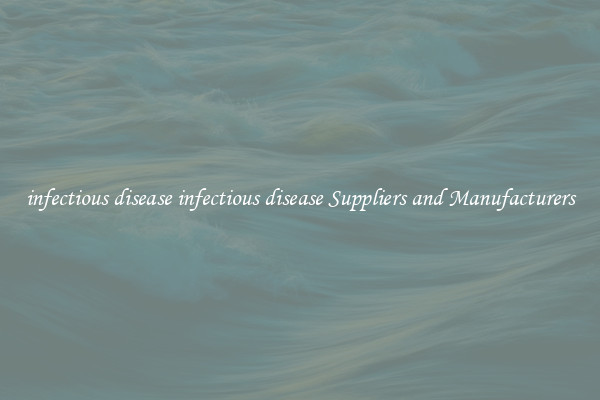infectious disease infectious disease Suppliers and Manufacturers
Infectious diseases are a global health concern that can spread rapidly and have a devastating impact on communities. With the increase in global travel and interconnectedness, the risk of infectious diseases emerging and spreading is higher than ever before. Thankfully, there are numerous suppliers and manufacturers dedicated to providing effective solutions to prevent and treat infectious diseases.

One of the key suppliers in the field of infectious diseases is pharmaceutical companies. These companies play a vital role in developing and manufacturing vaccines, antiviral drugs, and antibiotics. Vaccines are an essential tool in preventing infectious diseases by exposing the body to a harmless form of the pathogen, training the immune system to recognize and fight it. Pharmaceutical companies invest significant resources in research and development to discover new vaccines and improve existing ones.
In addition to pharmaceutical companies, diagnostic companies also play a crucial role in the fight against infectious diseases. These companies develop and manufacture diagnostic tests that can quickly and accurately identify specific pathogens. With early and accurate diagnosis, healthcare professionals can initiate appropriate treatment and containment measures, preventing further spread of the disease. Diagnostic tests are also important for surveillance purposes, allowing for the monitoring of diseases and the detection of potential outbreaks.
Furthermore, there are manufacturers that specialize in the production of personal protective equipment (PPE). PPE, such as masks, gloves, gowns, and face shields, is essential in preventing the transmission of infectious diseases. These manufacturers ensure the availability of high-quality PPE and contribute to the protection of healthcare workers and the general population.
Another important player in the field of infectious disease management is the medical device industry. Manufacturers of medical devices, such as ventilators and sterilization equipment, are vital in supporting the treatment and prevention of infectious diseases. Ventilators are crucial in supporting patients with severe respiratory symptoms, while sterilization equipment ensures the proper disinfection of medical devices and equipment to prevent the transmission of pathogens.
Research institutions and academia also play a significant role in infectious disease management. These institutions work on understanding the biology and transmission of pathogens, developing new treatment options, and conducting epidemiological studies to better understand the spread of infectious diseases. They collaborate with manufacturers and suppliers to translate their research findings into practical solutions.
In conclusion, the fight against infectious diseases requires the collaboration of various stakeholders, including suppliers and manufacturers. The pharmaceutical industry contributes by developing and manufacturing vaccines and drugs, while diagnostic companies provide accurate and rapid testing solutions. PPE manufacturers ensure the availability of protective equipment, and medical device manufacturers offer critical support in the treatment of infected individuals. Finally, research institutions and academia provide the necessary knowledge and expertise to combat infectious diseases effectively. Through their collective efforts, the global community can better prevent, treat, and manage infectious diseases, safeguarding public health and well-being.

View details

View details

View details

View details








